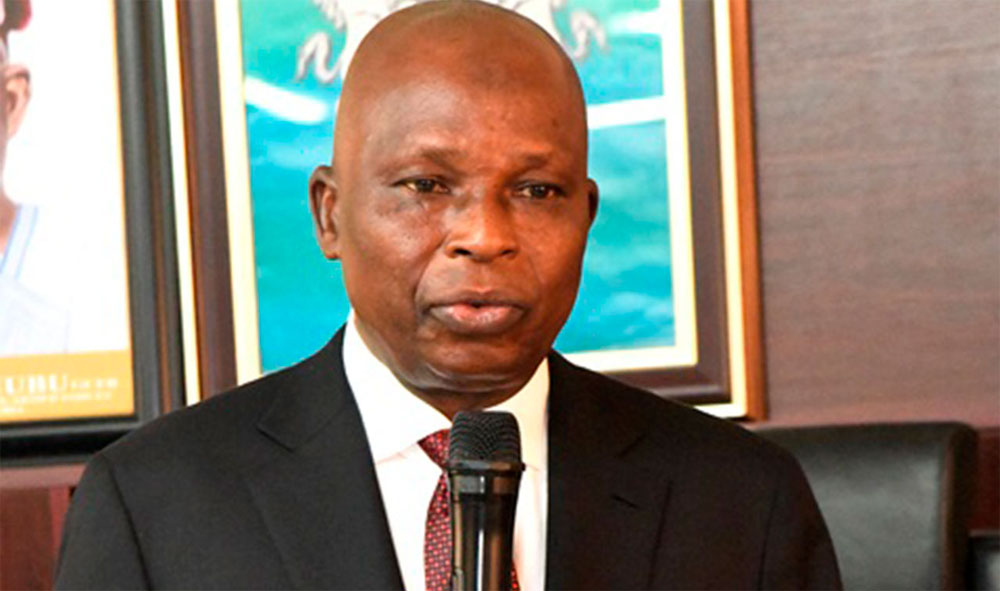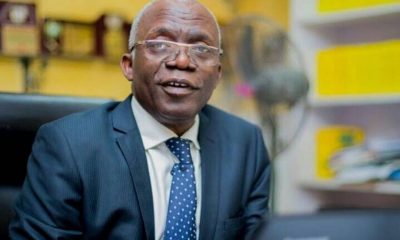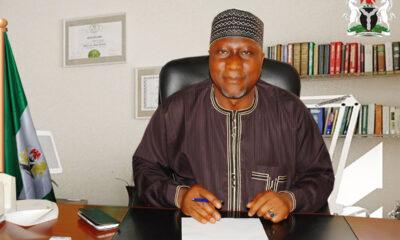“Now that the National Assembly is making a law to create additional states for the people of Southeast, it is reasonable, fair and timely to create additional local governments for Lagos State.”
News
Polytechnic workers give FG 21-day ultimatum on IPPIS

The Senior Staff Association of Nigerian Polytechnics (SSANIP) has given the Federal Government 21 days to address all the problems associated with the implementation of the Integrated Personnel and Payroll Information System (IPPIS).
This is contained in a communiqué issued on Tuesday at the end of the union’s emergency meeting in Abuja and signed by its President, Phillip Ogunsipe.
The association said, “The council-in-session observed that there has been disjointed implementation of salary in the Polytechnic since Integrated Personnel and Payroll Information System (IPPIS) commenced the payment of salaries for staff since February 2020.
It stated, “Some of the lingering issues associated with IPPIS include non-release of new minimum wage arrears, inconsistencies in the release of third party deductions, non-payment of COVID-19 hazard allowance for health workers, high draconian tax regime on consolidated salary and delay in the release of 2018 and 2019 promotion arrears.
“Against this backdrop, the council wishes to call on the relevant agencies of government to expedite actions toward resolving these highlighted challenges. Equally, the council wish to frankly state that failure of the IPPIS to address these highlighted challenges within 21 days from the date of this communiqué would leave the Union with no option than to review its stance on IPPIS.”
Commenting on school reopening of schools, the union said, “The council-in-session commends the efforts of the government at all levels, particularly the Presidential Task Force (PTF) on COVID-19 and Nigeria Centre for Disease Control (NCDC) towards flattening COVID-19 curve in the country.
“The council wishes to appreciate the wisdom and decision of the government to reopen schools across the federation, having facilitated modalities toward safety protocol arrangements at the Institution level.”
“The council for the umpteenth time expressed its displeasure at the way and manner the National Board for Technical Education (NBTE) has handled the Scheme of Service so far and condemned the decision of the Board to review the same scheme of service without due consultation with relevant stakeholders.”
It therefore stated, “On the strength of this, the council resolved that an attempt to foist a scheme of service document on SSANIP without our input is unacceptable and therefore would be an invitation to an atmosphere of industrial disharmony.
“The council wishes to specifically and frankly state that the failure of NBTE to address this issue within 21 days from the date of this communique would leave the Union with no other option than to declare industrial dispute.” It further observed that since the expiration of the tenure of the last governing councils for the federal polytechnics in May, 2020, the institutions have continued to function without the governing boards.
“In the understanding of the council, governing board occupies a very strategic position in the running of the polytechnic system. Therefore, the delay in the reconstitution of the governing councils is a challenge to the smooth running of the polytechnics. In view of the above, the council wishes to call on the Federal Government to expedite action on the re-constitution of governing councils for the federal polytechnics.”
The communiqué also stated, “The council-in-session expressed worry at the plethora of challenges faced by the State-owned Polytechnics and similar institutions across the country. Of particular concern were issues of haphazard and part-payment of workers’ salaries, non-implementation of the new minimum wage, non-domestication of the Contributory Pension Scheme, non-implementation of the 65 years retirement age in line with the relevant provisions of the Polytechnic Act (as amended), issue of migration to CONTISS 15, among others.”
News
Protest: Police combat ready, deploy 4,200 operatives to FCT strategic places

Protest: Police combat ready, deploy 4,200 operatives to FCT strategic places
The police say they are combat ready to crush any form of violence that may result from nationwide protests planned for next Thursday August 1 by some Nigerians against hardship and bad governance.
Indeed, starting with the Federal Capital Territory, Abuja, the police said it had deployed armed operatives to strategic locations.
The FCT Minister Nyesom Wike had earlier warned the organisers of the protest that Abuja would not be available for any rally or demonstration on August 1.
But a statement by Police Public Relations Officer, SP Josephine Adeh, in Abuja on Friday, said the FCT Command had deployed a total of 4,200 police officers to curb any form of violence that might arise from the protest.
The command was reacting in anticipation of the planned nationwide protest by some human rights activists and Nigerian youths, to publicly express their displeasure over hunger and hardship.
The planned protest has since generated massive traction on social media, especially on X.
According to Adeh, the command has proactively deployed material and human resources across the nooks and crannies of the nation’s capital.
The deployment, he said, was aimed at ensuring public safety, protecting protesters, and preventing protests from being hijacked by non-state actors.
The police command said the action was part of visibility policing, involving deployment of explosive ordinance devices (EOD) experts, and personnel at various strategic locations, raids on identified black spots, uncompleted buildings/shanties, stop and search, vehicular and foot patrol, and synergy with sister security agencies.
The Commissioner of Police FCT, Benneth Igweh, while acknowledging the right of residents to protest, advised that it should be peaceful.
He wrote, “The CP vows to resist all forms of violent protest and lawlessness, as the police will not be stampeded into allowing the destruction of public and private properties or loss of lives.
Residents are also advised to be vigilant and take advantage of the police emergency lines, to report suspicious activities through 08032003913, 08028940883, 08061581938, 07057337653 PCB: 09022222352, and CRU: 08107314192.
News
National Assembly urged to create more councils for Lagos

National Assembly urged to create more councils for Lagos
National Assembly has been urged to create more local governments for Lagos State, to meet its current population, social, economic and environmental challenges.
The Red Chamber is also advised to enact laws granting the state a special status for being the country’s commercial city and economic melting pot.
Renowned socio-political activist and critic, Chief Adesunbo Onitiri, made the demands in a statement in Lagos.
The activist recalled that in 1976 when the military government created states and local governments, Lagos and Kano states had 20 councils each.
“Later, Kano State councils increased to 44, while Lagos councils remained at 20. When the Abacha government carved out Jigawa State out of Kano State, Jigawa got 27 local governments, while Kano was still having 44 councils.
READ ALSO:
- Kano bakers summoned over bread price hike
- FG warns LG chairs misusing FAAC funds will face jail term
- PSG not giving up on Osimhen, seek further slash in price
“It is an injustice for Lagos State to remain with only 20 local governments till today, despite its gigantic social, security and economic problems,” Onitiri said.
He recalled that when the then Governor of Lagos State, now Nigeria’s President, Asiwaju Bola Ahmed Tinubu, created 37 additional councils in 1999, Chief Olusegun Obasanjo, then President, seized Lagos State federal allocations for two years.
He said Lagos State through the then Attorney-General, Prof. Yemi Osinbajo, sued the Federal Government, and the state government won the case against Federal Government at the Supreme Court.
He regretted that till now, National Assembly has not done the needful to enact a law to accommodate the 37 local governments created by Lagos State Government.
News
FG warns LG chairs misusing FAAC funds will face jail term

FG warns LG chairs misusing FAAC funds will face jail term
The Federal Government has threatened jail terms for Local Government Area chairmen who tamper with Federation Accounts Allocation Committee funds.
Lateef Fagbemi (SAN), the Attorney General of the Federation and Minister of Justice, made the announcement yesterday at the Human Rights Writers Association of Nigeria’s 17th annual lecture event in Abuja.
He stated that none of the chairmen have immunity and will be imprisoned if they tamper with funds designated for the development of their areas. Fagbemi stated, “We have a situation on our hands; I know that it is still there; the conduct of elections must be done by the states.”
“But the distinction is this: don’t forget, the governors have immunity, the local government council chairmen or councillors, they have no immunity, so they have to choose between dealing with the funds of the local government as they like and risking going to jail. The choice is theirs (LG chairmen).
“If they want to tamper with these funds and end up in jail, it is their choice. If they want to write their names in letters of gold, activities like construction or road upgrades must be returned to the local government. They don’t all have to come to Abuja.
READ ALSO:
- PSG not giving up on Osimhen, seek further slash in price
- Saudi duo to bid for Osimhen amid PSG stalled deal
- FG rolls out fresh plans to revive local manufacturing, create 4.4 million jobs
“If they stay at the local government, we will be able to reduce the level of insecurity that we have in Nigeria today. What obtains offshore is that the security agents are able to perform optimally because of information that comes to them from members of the public and usually it is from the grassroots.”
The minister said the federal government opted to use the supreme court to achieve local government autonomy due to the challenges it will face at state assemblies, stressing that any speaker who would have supported the cause will not survive the tenure or lose his reelection.
The Minister stated that for over two decades, local government administration in the country has been in comatose with state governments not remitting funds meant for the local governments.
Fagbemi, who urged security agents in the country to stop keeping suspects in detention beyond the period allowed by the constitution, added that detention without any court order will no longer be tolerated as appropriate sanctions will be applied to those found guilty of contravening the law of the land.
On his part, the National coordinator of HURIWA, Comrade Emmanuel Onwubiko, urged the federal government to cut down on the cost of governance.
He blamed corruption for the insecurity and high unemployment rate in the country, which is responsible for impending protests in the country.
FG warns LG chairs misusing FAAC funds will face jail term
-

 News3 days ago
News3 days agoNLC can’t withdraw from protest it didn’t organise – Ajaero
-

 News3 days ago
News3 days agoNorthern group attacks Reps Minority Caucus for demanding Nnamdi Kanu release
-

 News3 days ago
News3 days agoMinimum wage: Akpabio says domestic workers can’t earn less than N70,000
-

 News3 days ago
News3 days agoFG unveils training programme for 1,000 Nigerians in AI, blockchain
-

 International17 hours ago
International17 hours agoNetanyahu, Biden hold talks over tense Gaza ceasefire
-

 News3 days ago
News3 days agoFalana to FG: Threatening Nigerians won’t stop mass protest
-

 metro1 day ago
metro1 day agoNERDC Executive Secretary Prof Ismail Junaidu slumps, dies
-

 metro3 days ago
metro3 days agoPastor remanded for allegedly defiling teenager, attempting abortion












You must be logged in to post a comment Login